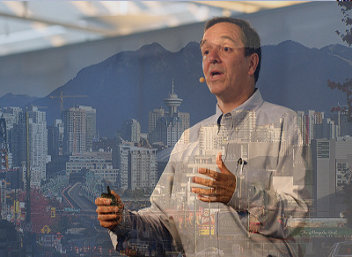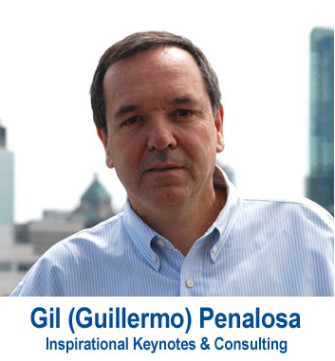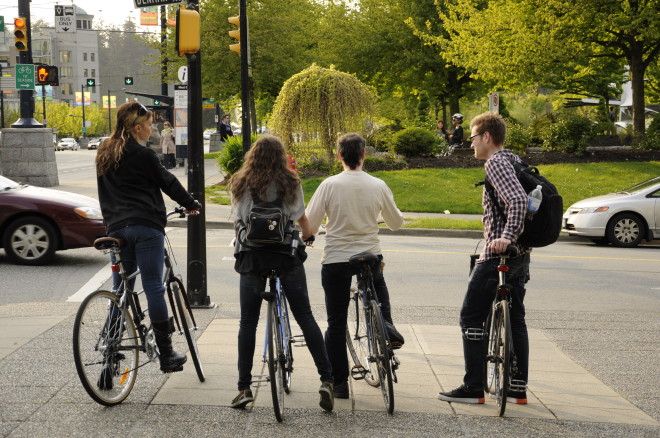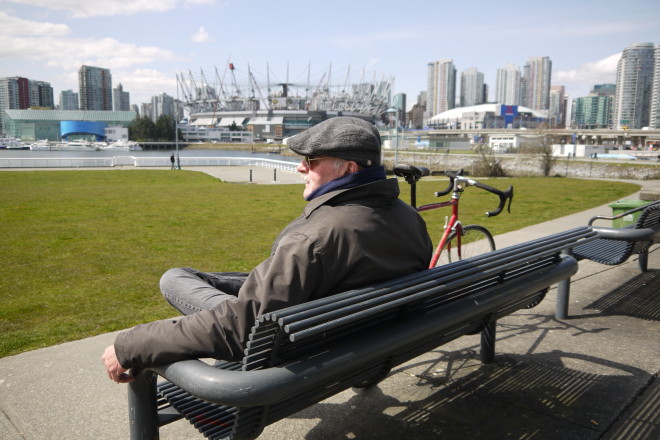
The Best Way to Promote Cycling 'Is to Not Talk About Cycling'- In the Bicycle Seat with Gil Peñalosa
Gil Peñalosa. A man capable of inspiring just about anybody, be they a transport planner or an everyday commuter, talks to ECF about Transport Policy, Velo-city Global going to Vancouver and what we should be doing if we want more people cycling…
Gil Peñalosa
Gil is the Executive Director of Canadian non-profit organization 8-80 Cities and former Commissioner of Parks, Sports and Recreation in Bogota, Colombia. He also works as Senior Consultant for the renowned Danish firm Gehl Architects. And he serves on the Boards of Directors of American Trails, Ciclovias of the Americas, and City Parks Alliance. He’s a regular on the international conference circuit and his passion is not easily forgotten.
It’s hard not to forget Gil Peñalosa from last year’s Velo-city in Seville. He’s passionate, he’s motivated and he has the uncanny ability to soften up even the most hardened politician. With Velo-city Global heading to Canada, and we had more than a few pressing questions to ask. How can a city like Vancouver ever aspire to becoming a cycling destination like Amsterdam? Can urban sprawl really be married with cycling solutions? And why on earth should we travel all the way to Vancouver, Canada this summer for a bicycle planning conference?
Meet Gil.
“Cities should be about people,” Peñalosa says. Based in Toronto with his organization 8-80 Cities, he regularly travels the globe and speaks on active transport and livable cities. And he’s delighted to see Velo-city come to Vancouver.
“They’re doing a lot of great things for cycling there” he tells me before adding “but they’re not great yet.”
Peñalosa sees the conference as a showcase of global expertise. An expected 1000 participants will come to the conference from a wide variety fields: traffic planners, cycling advocates, architects, politicians - in short just about anybody you can imagine shapes cycling policy. But is it too dreamy to really think that Vancouver could reach cycling levels like those seen in Amsterdam?
“Even in Europe, a lot of the bicycle infrastructure has been done in the last 30 years,” Peñalosa explains. “And it didn’t get there by chance.”
Much of what is seen in Amsterdam for example, came about during the 1970s, when cycling levels dropped to an all-time low, only to be reversed after active campaigning from concerned Dutch citizens. In other words, if there is a concerted political effort, Peñalosa believes that cycling levels in Vancouver could reach Amsterdam standards.
“Good things are starting to happen in North America. Cycling is starting to increase. There are cities that are doing good things. Even New York, with its long history of car-centric planning, is really doing major transformations in a short period of time. In Canada, I think that cities like Vancouver and Montreal are ahead of the bunch as well”.
Urban Sprawl and Cycling: An Improbable Marriage?
An often cited argument, especially in North America, is that cycling can’t work in cities the size of Vancouver. Urban Sprawl and cycling simply don’t mix.
Peñalosa however is keen to debunk this myth, pointing to the recent Benchmark report on cycling in the US.
“40% of trips are less than 2 miles. 90% of them are done by car. If we focus on the trips which could be done in 15-20 minutes, the potential for cycling there is huge”.
Another point which Peñalosa points to is Public Transport. He believes that bicycles offer the perfect complement to public transport. And for transport planners, it’s a cost effective solution
“Many cities invest billions in public transit. But there is no form of public transport that will drop you off in front of your house” says Peñalosa, continuing “Even in sprawl cities, bicycling can play a huge role. Planners need to see how a bicycle can complement public transport.”
Public bicycle share systems alone have the ability to make the number of public transport ‘stops’ within reach 9 to 16 times larger.
It’s one of the best marriages possible.
How do you sell cycling?
How do you sell cycling to politicians? According to Peñalosa the best way to promote cycling “is to not talk about cycling”. It’s to talk about public health, or about mobility, or about the environment. Basically, Peñalosa says you have to talk about “why” before talking about “how”, especially in places where cycling has yet to kick off.
“Imagine you have a city with 2% cyclists and 60% of people using cars people. People will say you are against the 60%,” says Peñalosa.
"Cyclists are often too keen to talk about cycling, and forget about the whole package. If you introduce cycling as a solution for obesity for example you are suddenly not only trying to help other cyclists but a whole population."
He’s adamant that no public health system in the world will survive if it is only curative. It has to be preventive.
“According to the World Health organization all we need to do is cycle 30 minutes per day, and just make it part of our routine” Peñalosa explains before adding, “it should really be prescribed by doctors across the globe.”
Penalosa speaking in Canada, 2011.
The Magic Formula: Slow down and Segregate.
Politicians often want to have a magic formula when it comes to cycling. How do we get more people on bicycle? With his wealth of experience, Gil said that you need to focus on two major things. The first ‘must have’ is slowing down streets.
“Reduce the speed in all neighborhoods. I’m talking 30 km/h or less. All of the neighborhood roads should be 30 km/h.”
Peñalosa believes part of the answer in this lies in street design. You need to make it physically difficult for cars to go fast. You need to create barriers.
“It’s a real paradox. People actually want to have 30 km/h in their own neighbourhood, but where they don’t live they want to go fast”
An EU-wide survey conducted in 2010 showed overwhelming support for 30 kph zones with 78 percent of EU drivers citing excessive speed as a major safety concern. And the potential to save lives is amazing. According to European Transport Safety Council, if a car hits you at 30 km/h, you have only a 5% probability of being killed while at 65 km/h you only have a 5% chance of surviving. Peñalosa’s calls are also backed by ECF, the European Parliament and other NGOs such as the British campaign “twenty’s [miles] plenty”.
The second 'must-have' is segregated bike lanes on all arterial roads.
“You need physically separated bike ways. And you don’t just need one separated bike path. You need a whole network.”
A recent study from Lancaster University points to this policy formula (30km + segregation) being a winner. Professor Colin Pooley, author of the study, calls upon "the provision of fully segregated cycle routes on all arterial and other busy roads in urban areas" and makes clear that "most non-cyclists and recreational cyclists will only consider cycling regularly if they are segregated from traffic".
Building more segregated cycle routes on arterial and other busy roads isn't as big a task as some would have you believe. As a general rule, they represent between 5-10% of the urban landscape.
Why Vancouver?
And finally why should we bother to make it all the way from Europe to Vancouver?
Peñalosa laughs and tells me that “it’s impossible to not love Vancouver. It is a magnificent city and has been doing a lot of things right. Look at any quality of life ranking. Vancouver is always in the top 5 cities”.
He suggests that those attending the Velo-city conference also should visit nearby cities such as Portland and Seattle to get a glimpse at different ways of organizing cities. Peñalosa explains that the timing of the conference is perfect
“For people coming to Vancouver in June, it’ll be the best month of the year. God was very generous with the city. It has beautiful ocean and mountains”
Now it’s also time for it to be blessed with bicycle infrastructure as well.
 About the Author
About the Author
Julian Ferguson is the Communications Officer for the European Cyclists’ Federation. Originally hailing from Australia and a keen bicycle advocate, he plans one day to ride his bicycle from Brussels to Melbourne
Why the interest in North America?
ECF is not just interested in cycling in Europe. We think it’s important to take a global perspective. So much so that our next big conference, Velo-city Global 2012, is taking place in Vancouver on the 26-29th of June. It’s the biggest cycling planning conference in the world, bringing together the best and the brightest in cycling and transport policy. Check out the conference website here, and register now for discount early bird tickets. It’s going to be a great event.
Contact the author
Recent news!
Upcoming events
Contact Us
Avenue des Arts, 7-8
Postal address: Rue de la Charité, 22
1210 Brussels, Belgium













